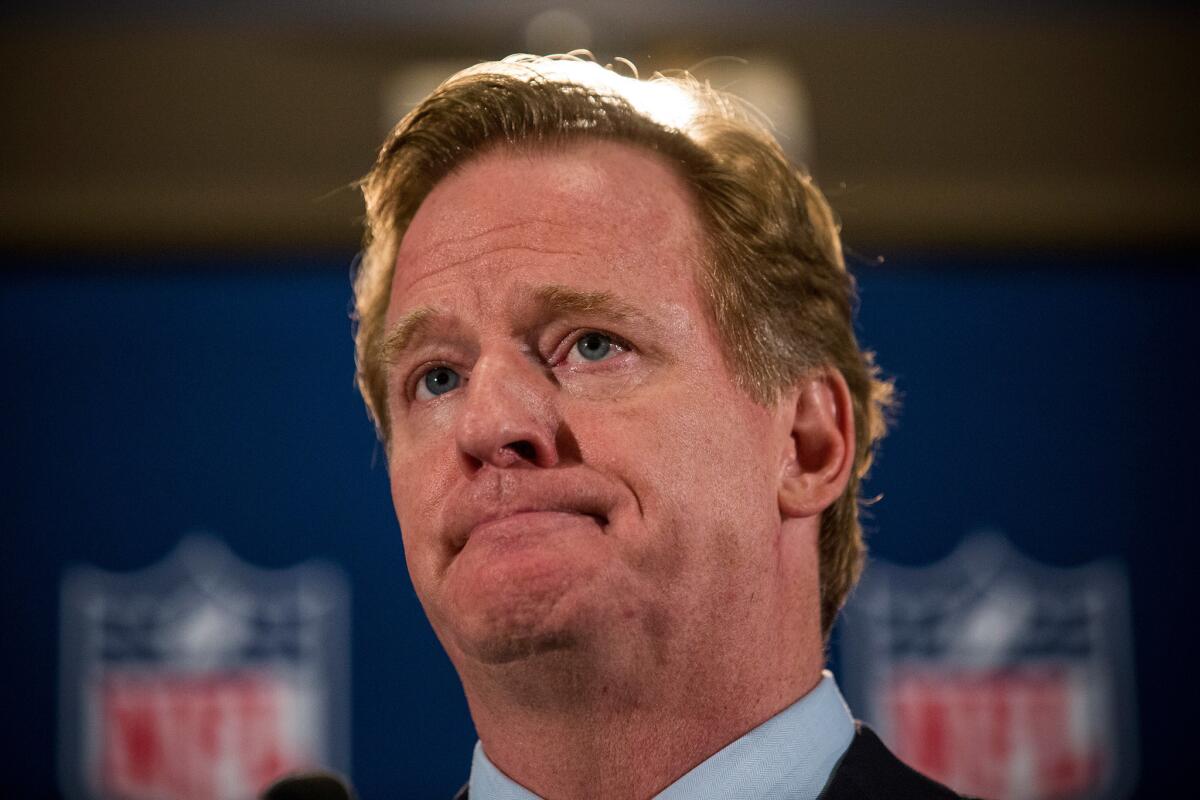Opinion: Two former NFL wives recount their abuse, and league indifference

- Share via
One of the recurring themes we read and hear from domestic violence victims is the sense of isolation, the fear of seeking help, the desperation that comes with feeling both defenseless and without options.
The Washington Post has an interesting piece based on interviews with two women who say they were beaten by their partners who were players in the National Football League, an article that one hopes will help keep the story, and the issue, alive in the national discourse. Typical of our society, the issue was initially spotlighted because it intersected with fame, and entertainment – the video of player Ray Rice punching his fiancée into unconsciousness.
But the issue has been around for years. USAToday maintains a database that lists about 90 domestic violence arrests since 2000. In about a third of the cases the charges were dropped, often because the spouse or girlfriend stopped cooperating with investigators. The number-crunchers at Five Eight blog determined that the rate of domestic violence arrests of NFL players is less than that of men in general.
But that doesn’t take into account the battered women who don’t seek the arrest of their ball-playing husbands. The Post story takes us inside the thinking of some of those women. It would have been a stronger piece with more voices – there are only two women cited, and one is unidentified – but their stories have the ring of truth as they describe a culture in which protecting the brand and the public career outweigh protecting the safety of the battered wives. And situations in which women opt for silence in fear of losing financial support.
According to the story:
“It’s counterintuitive to the outside world: Women should leave their abusers, and their abusers should be punished. But the NFL is a unique universe with an overwhelmingly male workforce whose members are lionized in the press and in their communities; a we’re-all-in-this-together ethos; and incentives for the managers, coaches, and union reps to keep negative stories under wraps. Going to authorities, whether police or hospitals, means social exclusion and, more importantly, negative media attention that could end your husband’s career. Justice imperils their belonging and their livelihood.
“The wives, whose husbands ended their playing careers in the 2000s, say they knew of no safe alternative — no liaison to players’ families, no counselor, and no procedure for reporting abuse.”
NFL Commissioner Roger Goodell, who has managed this (and other) issues as though he were trying to create a “don’t do it this way” case study for crisis communications classes, last month visited a domestic violence hotline center, has appointed a committee to shape the league’s policies on domestic violence and sexual assault, and appointed former FBI Director Robert Mueller to investigate the league’s handling of the Rice affair.
Goodell would have been better served – and sent a stronger message – if he had brought together a group of NFL wives who have been battered by their husbands to hear how the league handled their complaints. The committee is being led by an existing NFL executive who used to handle fundraising and community affairs, which doesn’t exactly instill confidence that Goodell really has reform in mind. And Mueller works for a law firm that represents the league in other matters. Mueller may do a sterling job, but the appearance of a conflict is hard to get around.
We’re more than a thrid of the way through the NFL season, and this issue has faded from the public discourse, driven under by our persistent short attention span, but also by war and plague.
But the isn’t issue going away. We need, as Bruce Cockburn once sang in a different context, to keep kicking at the darkness until it bleeds daylight, a fittingly violent metaphor for bringing the issue into full view.
Follow Scott Martelle on Twitter @smartelle.
More to Read
A cure for the common opinion
Get thought-provoking perspectives with our weekly newsletter.
You may occasionally receive promotional content from the Los Angeles Times.










